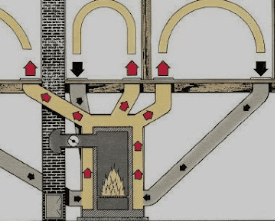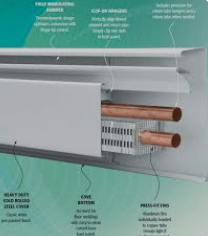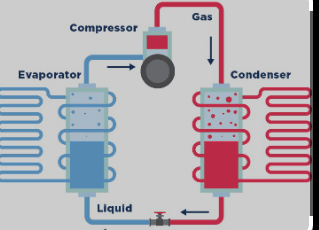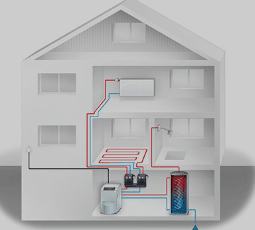Home heating systems are important for keeping your home at a comfortable temperature. This article will talk about the different kinds of heating systems, like heaters, boilers, and heat pumps, and what the pros and cons of each are.
We will also talk about important things to think about when picking a home heating system, like how much it costs, how energy efficient it is, and how it affects the environment. By the end, you’ll have a better idea of which heating system fits your wants and preferences the best.
Let’s dive in and learn more about how home heating systems work.
Forced Air Heating/cooling Systems
One of the most popular ways to heat and cool a home today is with a forced air system. Homeowners often choose these systems because they can quickly and effectively heat or cool a room. A furnace or heat pump makes hot or cold air, which is then sent through pipes and into different rooms of the house.
This way of heating or cooling makes sure that every room is at the perfect temperature all year long. Not only are forced air systems efficient, they also filter the air, which makes the quality of the air inside better. These systems can also be easily connected to smart thermostats, which give you exact control over the temperature and energy use.
Overall, forced air heating and cooling systems are a safe and efficient way to keep your home comfortable.
Pros
There are many good things about home heating systems that make them a popular choice among homeowners. The fact that they keep the house warm all the time is one of their best features, making sure that you can live comfortably even in the coldest months. You can also change these systems to fit your needs; you can choose from choices like radiant floor heating, forced-air systems, or boilers.
Because of this, homeowners can pick the system that fits their wants and budget the best. Modern heating systems are also made to use less energy, which not only saves money on utilities but also has less of an effect on the earth. The newest technological advances have also made these systems more reliable and easier to manage, which gives homeowners more peace of mind and ease.
Because there are so many choices, residents can find a heating system that meets their needs and gives them the most comfort and efficiency.
Cons
There are some problems with home heating systems that people need to think about. One big problem with these systems is that they are expensive to set up and keep up. The initial cost can be quite high, depending on the type of system picked.
Also, the costs of repairs and normal maintenance can add up over time. A second problem is that energy might not be used as efficiently. Some heating systems may use more energy than they need to, which can cause your power bills to go up. Another problem is that some heating systems are bad for the climate.
Some methods might put harmful chemicals into the air, which would add to pollution and climate change. Finally, the noise that some heating systems make can be annoying, especially in houses or homes that aren’t very big. It is still important for people to carefully weigh the pros and cons of each home heating system before choosing the one that best fits their needs.
Gravity Air Furnace Systems
A lot of people choose gravity air heater systems to heat their homes because they work well and are easy to use. Forced-air systems use fans to move heat around, but gravity systems use the fact that warm air rises and cool air falls naturally to do their job.
Usually, this kind of system has a heater in the basement or on the first floor, and it uses ductwork to send warm air all over the house. People can get even and consistent heating in every room of their house with a gravity air furnace setup.

As the warm air rises from the heater, it moves through the ductwork and heats every room. Because it doesn’t have any fans or blowers, this kind of device is also known for being quiet. On top of that, gravity systems require less upkeep and have fewer parts than forced-air systems.
This means that technical problems are less likely to happen and it’s easier to figure out what’s wrong if they do. Most of the time, gravity air heating systems are an easy and effective way to keep your home warm and cozy in the winter.
Pros
Home heating systems have many benefits for their owners. In the first place, they keep the whole house warm, which is very important during the colder months. With their advanced technology, these systems are good at spreading heat widely and getting rid of any cold spots.
Modern home heating systems are also very good at using energy, which helps people use less energy and pay less for their utilities. A lot of systems can also be programmed, which lets people set the temperature and schedule they want, which makes everyday life easier. These systems also come in different shapes and sizes to fit different needs, whether you live in a small apartment or a big family home.
Lastly, home heating systems are known for being long-lasting, needing little upkeep and being reliable for a long time. In conclusion, buying a good home heating system can make any house much more comfortable and save a lot of energy.
Cons
People who own homes should know that heating systems have some flaws that they should be aware of. One problem is that installation costs a lot up front. The starting cost can be quite high, depending on the size and type of the system.
Another problem is that it costs a lot to maintain and fix. To get the best performance, the machine needs to be serviced and fixed on a regular basis, which adds to the total cost. Also, older furnaces and other heating systems may not use energy efficiently, which can cause your electricity bills to go up.
Another worry is how some heating systems, especially those that use fossil fuels, affect the climate. These processes add to climate change by releasing carbon into the air. It is important to compare these cons to the pros and figure out which heating system fits your needs and budget the best.
In-floor Radiant Heating Systems
In-floor radiant heating systems are a great way to heat your home that uses very little energy. Traditional forced-air systems work by blowing hot air through vents. Radiant heating, on the other hand, uses lines in the floor to move warm water around.
With this method of heating, your living areas will always be warm and comfortable, with no cold spots or drafts. The use of radiant heating systems is also known to be energy efficient because they don’t need ducts, which can let heat escape.
You can put these systems down under different types of flooring, like tile, hardwood, and carpet, which makes them a good choice for any home. With their ability to spread heat evenly and lower energy costs, in-floor radiant heating systems are a modern and comfy choice for people who want to heat their homes more efficiently.
Pros
Home heating systems have a lot of benefits for people who live in them. For starters, they provide a steady and dependable source of heat, which is nice in the winter. Being able to change the temperature settings lets people make their own comfort levels, keeping them warm in their own homes.
Home heating systems also encourage people to use energy efficiently, which lowers their carbon footprint and saves them money on their electricity bills. With the help of new technologies, these systems are now better for the earth because they use less energy while still doing their best. Another benefit is that there are many choices, so people can pick the heating system that fits their wants and preferences the best.
Different types of heaters and heat pumps are available to fit the needs of every home. Putting money into a reliable home heating system not only makes the house more comfortable, it also raises its value. Overall, the good things about home heating systems make them an important part of any warm and energy-efficient home.
Cons
There are some problems with home heating systems that people should be aware of. One big problem is that it costs a lot to put and keep up. It can be very expensive to replace or upgrade a heating system, especially in older homes that may need a lot of changes.
Regular repairs and upkeep can also add up over time, making the total cost higher. Another problem with home heating systems is that they might not use energy as efficiently as they could. Your electricity bills may be higher because older systems may not use as little energy as newer ones.
Some heating systems, like oil or electric heaters, can also hurt the environment because they release carbon into the air. Lastly, the type of system may make it hard to control the heating zones, which can make the whole house feel unevenly warm.
Even with these problems, homeowners can make their homes more comfy in the winter by carefully considering the pros and cons and keeping up with regular maintenance.
Traditional Boiler And Radiator Systems
Boilers and radiators have been a safe way to heat homes for a long time. In these systems, there is a central boiler that warms water that is then sent to radiators in each room through pipes. The heaters give off heat, which makes the room feel warmer and cozier.
One of the good things about these systems is that they can spread heat evenly and consistently throughout the house. They are also known for being strong and long-lasting, which makes them a popular choice among homes. They can last for many years if they are well taken care of and have regular upkeep.
But it’s important to think about how energy-efficient old boiler and radiator systems are because they might not be as good as modern ones. Before making a choice for your home, you should look into other ways to heat it and weigh the pros and cons of each.
Pros
Home heating systems are a popular choice among homes because they have many benefits. To begin, one of the best things about them is that they use less energy. As technology has improved, new heating systems are made to use as little energy as possible, which means lower electricity bills.
These systems also make sure that the heat is spread evenly and consistently throughout the house, making sure that every room is a warm place to live. Heating systems for homes also come with programmable heaters that let people set the temperature to their liking and on their own time, making things easier overall.
For added convenience, these systems come in various forms, including furnaces, boilers, and heat pumps, so homes can pick the one that best fits their needs. One important benefit is that these systems improve the quality of the air inside by filtering out dust, allergens, and pollutants. This makes the living area healthier and cleaner.
Overall, home heating systems are comfortable, efficient, and easy to change for each user.
Cons
There are some bad things about home heating systems that people should be aware of. One problem is that the system is expensive to buy and set up at first. The cost can be high depending on the type of system picked, like a furnace or boiler.
Some heating systems may also need to be fixed and maintained on a regular basis, which can add to the total cost over time. Another problem is that the system might not use energy efficiently, especially if it is old or not well taken care of. This can cause energy costs to go up and have a bigger effect on the environment.
Lastly, some heating systems can make the air dry, which can be uncomfortable for some people and make their breathing problems worse. When choosing a home heating system, it’s important to think about these cons and weigh them against the pros so you can make an informed choice.
Hot Water Baseboard Radiator
Hot water baseboard heaters are a good way to heat your home quickly and efficiently. The hot water in these radiators moves through a network of pipes that are linked to baseboard units. As the hot water moves through the lines, it warms the air in the room, making it cozy.
One good thing about hot water baseboard heaters is that they can heat a room evenly. There are no cold spots or drafts because the heat is spread out along the whole length of the floor unit. Hot water baseboard heaters are also known for being very quiet when they’re working.
Forced air systems can be loud, but these fans don’t make any noise, so the room will be quiet. Plus, hot water baseboard radiators can use different fuels, like natural gas, oil, or electricity, which makes them a flexible choice for homes.

In general, hot water baseboard heaters are a safe and effective way to heat your home.
Pros
A lot of people choose home heating systems because they have a lot of benefits. They save energy, which is one of their benefits. Modern heating systems are made to waste as little energy as possible, which lowers heating bills and has a positive effect on the environment. They can be used in a lot of different ways, which is another benefit.
People who own homes can pick from different heating systems, like forced-air, radiant, or geothermal ones, to suit their own wants and tastes. Also, a lot of heating systems now come with programmable thermostats that make it easier and more accurate for homes to control the temperature inside.
It makes the room more comfortable and saves money on heating costs. Some heating systems are also compatible with smart home technology, which lets people handle their heating from their phones. Because of these benefits, home heating systems are an important part of any comfy and energy-efficient home.
Cons
One bad thing about home heating systems is that they are expensive to build and keep up. This can be a big initial investment, especially if you choose methods that are more advanced and use less energy. Repairs and upkeep that need to be done all the time can also add up over time.
Another problem is that the warmth might not be even throughout the house. Some places may be warmer than others, making people uncomfortable and requiring extra heating solutions in those places. Another con to think about is that many home heating systems use fossil fuels.
Not only does this hurt the environment, but it can also make people subject to changes in the price of fuel. Lastly, some heating systems can be loud, which can make life difficult in the house. Even with these problems, a lot of people still choose home heating systems because they keep them nice and cozy in the winter.
Heat Pump Heating Systems
It’s common for people who want to heat their homes properly to choose heat pump heating systems. To work, these systems move heat from the outside into the house instead of making heat like most heating systems do. One great thing about heat pump systems is that they use less energy because they use the heat that is already in the air, even when it is cold outside.

This could save a lot of energy and bring down your heating bills. Heat pump systems are also useful because they can cool your home in the summer, making them flexible and affordable. Another good thing about heat pump systems is that they are good for the earth because they don’t use fossil fuels to make heat.
Overall, heat pump heating systems are a great choice for people who want to keep their homes warm in an efficient and eco-friendly way.
Pros
Having a home heating system has many benefits. One of the best things about them is how well they keep you warm and cozy in the winter. These systems make sure that the house stays at the right temperature, making it a comfortable place to live.
In addition, home heating systems are very flexible and can be changed to fit each person’s needs. There are many choices for radiant floor heating and forced air systems, so you can find one that fits your needs. One more benefit is that these devices can help save energy.
A lot of current heating systems are made to use less energy, which helps people lower their utility bills and reduce their carbon footprint. Lastly, these systems improve the quality of the air inside by filtering and cleaning it better. This makes the space where people live healthy.
To sum up, home heating systems have many advantages that make them a great purchase for any house.
Cons
There are some bad things about home heating systems. One big problem is that these systems are expensive to set up and keep up. The costs of installing a system can be very high at first, depending on the type you choose. Repairs and maintenance that are done on a daily basis can also add up over time.
Another problem is that some heating systems are bad for the climate. Air pollution and greenhouse gas releases are made worse by some systems, like those that use fossil fuels. In the long run, this could be bad for both people and the earth.
The last thing is that home heating systems can be loud. If you have a heater or a heat pump, the noise they make can be annoying and make it hard to do other things. Finally, home heating systems keep you nice and cozy, but it’s important to think about the cons before making a choice.
Electric Resistance Heating Systems
A lot of people choose electric resistance heating devices to heat their homes. The electricity energy in these systems is turned into heat, which keeps you warm and cozy in cold weather. Electric resistance heaters make heat with coils or elements. The heat is then sent through a network of pipes or radiators to different parts of the house.
One good thing about electric resistance heating systems is that they are not too hard to set up or keep up. They also have separate controls for each room, so the temperature can be set to suit each room. But it’s important to keep in mind that electric resistance heating may use more energy than other types of heating, like heat pumps.
So, when choosing the best heating system for your home, it’s important to think about things like insulation and energy costs.
Pros
Home heating systems have many benefits for their owners. They’re made to keep you warm and cozy during the winter, making sure your home is a cozy place to be. One of the best things about home heating systems is how well they work. Thanks to progress in technology, current heating systems use a lot less energy, which means lower bills and a smaller impact on the environment.
As an added bonus, the heat is spread evenly and consistently throughout the house, making every room a warm place to live. These systems also have temperature controls that can be changed, so people can make the heat exactly how they like it. There are also different kinds of home heating systems, like heaters, boilers, heat pumps, and radiant heating, so people can pick the one that works best for them.
Getting a home heating system, like a forced-air system, a radiant floor heating system, or a ductless mini-split, is a good idea if you want to stay warm and cozy this winter.
Cons
There are some problems with home heating systems that you should think about before making a choice. One of the main problems with these systems is that they are expensive to set up and keep up. The starting cost can be pretty high, especially for systems that are more advanced or use less energy.
Also, the system needs to be maintained and fixed on a regular basis to make sure it works right, which can add to the total costs. Energy waste is another problem that could happen. Heating systems that don’t work well can cause energy prices to go up and damage the environment.
Some heating systems may also make noise while they’re working, which can be annoying for people who live in the house. Lastly, some types of heating systems, like radiators, take up room that could be used for something else. Even with these problems, residents can find the best heating system for their needs if they do their research and think about their options.
Hybrid Heat Systems
Hybrid heat systems are becoming more and more popular among people who want to make their home heating systems more efficient. By taking the best parts of both electric and gas heating systems and putting them together, a hybrid heat system is a flexible way to keep your home warm.
By instantly switching between electric and gas heating based on the temperature outside, these new systems make the best use of energy. With its energy-saving features, the electric heat pump warms the house efficiently when the weather is light. On the other hand, when it gets really cold, the gas furnace steps in to provide steady, strong heat.
One of the best things about hybrid heat systems is that they can adjust to different weather conditions, keeping your home at a comfortable temperature all the time. They also give homes the freedom to pick the fuel source that is most cost-effective based on current prices.
To sum up, combination heat systems are an effective and flexible way to heat your home. These systems give residents comfort, energy savings, and flexibility all year long by combining the best parts of electric heat pumps and gas furnaces.
Pros
There are many good reasons to buy a home heating system that make it a good investment for homeowners. In the first place, they make sure that heat is evenly distributed throughout the whole house, so every room stays nice and cozy. This is very helpful during the winter months when keeping a warm home temperature is important.
Second, current heating systems are better for the environment and use less energy, which lowers both carbon emissions and energy costs. This is good for the environment and can help you save money on your energy bills over time. Also, home heating systems come with a variety of fuel choices, so people can pick the fuel source that is most cost-effective and convenient for them in their area.
There are different choices for everyone, whether they want to use natural gas, electricity, or renewable energy sources like sun or geothermal. Overall, home heating systems make homes more comfortable, use less energy, and give people more options, which makes them a great choice for any family.
Cons
A home heating system can be helpful in many ways, but it’s also important to know what can go wrong. One big problem is that it costs a lot to put and keep up. It can be pricey to replace or upgrade your heating system, especially if you choose one that uses less energy.
Also, repairs and maintenance that are done on a daily basis can add up over time. Another problem is that it might break down or not work right. Heating systems can break down at any time, even if they are well taken care of. If they do, you won’t have heat until the problem is fixed. Another problem is that the heating isn’t very efficient, especially with older systems.
They might not spread the heat around the house properly, leaving some areas hot and others cold. Lastly, some kinds of furnaces and other heating systems can produce carbon monoxide, a gas that has no color or smell and can kill you if you breathe it in.
To stay safe, you need to make sure there is enough air flow and check for gas leaks often. Even with these problems, knowing the cons of home heating systems can help you choose the best way to heat your house.
Ductless Mini-split
In recent years, ductless mini-split home heating systems have become more popular because they are efficient and can be used in a variety of ways. Ductless mini-splits don’t need ductwork like standard heating systems do. Instead, they have an outdoor unit and one or more indoor units that are linked by a refrigerant line.
This lets you heat only certain parts of your home, which is a cheap option for people whose heating needs change throughout the year. Another benefit of ductless mini-splits is that they are easy to install because they don’t need a lot of changes to the pipes.
These systems also let you precisely control the temperature, so you can make your own comfort zones in different places. Thanks to their small size and quiet operation, ductless mini-splits are also great for keeping homes warm without sacrificing style. A ductless mini-split system can help you heat a room or keep the whole house at a comfortable temperature.
Pros
There are many great things about home heating systems that make them a great choice for homeowners. First, they provide reliable and consistent heat throughout the house, making it a warm place to live even when it’s very cold outside. For people with health problems or in the winter, when staying warm is very important, this level of comfort is especially essential.
Second, home heating systems are efficient, which means they use less energy and keep power bills low. These systems are made to spread heat around as evenly as possible and keep it from escaping, which saves residents money on their heating bills over time. Lastly, home heating systems can make a house more valuable, which makes them appealing to people who want to buy it.
Homeowners can improve their comfort, save money, and raise the value of their home by installing a heating system that works well and uses little energy.
Cons
There are some bad things about home heating systems that people should be aware of. One big problem with these systems is that they are very expensive to buy and set up. The starting cost can be quite high, depending on the type and size of the heating system.
Also, heating systems need to be serviced and fixed on a frequent basis, which can add to the costs. Another problem is that energy might not be used as efficiently. Some heating systems, especially older ones, may use a lot of energy, which can make your electricity bills go up.
In addition, some heating systems, like those that use fossil fuels, can be bad for the earth. Greenhouse gas releases and air pollution are caused by them. Last but not least, not every home can use every heating system. Size, layout, and insulation are some of the things that decide how well and how well with other systems a system works.
People who own their own homes should carefully think about these cons before choosing a home heating system.
Wood Heating Systems
Wood heating systems are a popular choice among homes because they are environmentally friendly and don’t cost too much. These heating systems get their heat and comfort from wood, which is burned as their main fuel source during the winter. One great thing about wood heating systems is that they can be used in a lot of different ways.
These things can be used in many places, like homes, houses, and even bigger business buildings. Wood is a renewable energy source, so wood heating systems are also a green option to traditional heating methods. People can help make the environment greener and lower their carbon footprint by burning wood.
Of course, wood heating systems can be a cheap choice, especially for people who can easily get firewood. Overall, wood heating systems are a good way to heat your home that is also good for the environment.
Pros
Heating systems for homes have many benefits that make them necessary for every home. One of the best things about them is how well they work. Modern heating systems are made to keep you warm while using as little energy as possible, which saves you money on your monthly bills.
One more benefit is that they are easy to use. Programmable thermostats and smart home technology make it easy for people to control and automate their heating system, which keeps their homes warm all the time. Home heating systems also help clean the air by moving and filtering it, which lowers the amount of allergens and toxins in it.
Also, many heating systems now come with eco-friendly options that use renewable energy sources or high-efficiency parts, making them choices that are good for the earth. Home heating systems are a good investment for any home because they keep you warm, make you feel comfortable, and use little energy.
Cons
Cons of Home Heating Systems: There are some things that can go wrong with home heating systems. One problem that many people have is that installation and upkeep are very expensive. The starting cost can be quite high depending on the type of system you pick, like a furnace or heat pump.
Also, fixes and maintenance that need to be done all the time can add up quickly. A second problem is that energy might not be used as efficiently. Your utility bills may go up if you have older systems or ones that haven’t been kept well. Some home heating methods can also be dangerous and unhealthy.
For instance, heaters that use oil or natural gas can make carbon monoxide, which is a dangerous gas that needs to be vented properly. Overall, home heating systems keep you warm and cozy, but it’s important to think about these cons before making a choice.
Choosing A Home Heating System
Picking the right home heating system is a big choice that can have a big effect on your comfort and your energy bills. When making this choice, it’s important to think about things like your budget, the size of your home, and how energy efficient the options are. A forced air heating system is one choice to think about. This type of heating uses ducts to move warm air around your home.
Natural gas, oil, or electricity can all be used to power this kind of machine. You could also use radiant heating, which includes putting heating elements in your home’s floors, walls, or ceilings. This gives you a steady and effective way to heat your home.
You could also think about a heat pump system, which moves heat from the ground or air to and from energy. You can heat or cool your home with this system, which works very efficiently. In the end, it’s best to talk to a trained HVAC professional who can look at your home’s needs and help you choose the best heating system.
You can make sure your home is warm and energy-efficient this winter by making an intelligent choice.
Frequently Asked Questions On Home Heating Systems
How Do Home Heating Systems Work?
The air or water in a home heating system is heated by a source of heat and then sent through vents or pipes to different rooms.
What Types Of Home Heating Systems Are There?
Forced-air stoves, heat pumps, boilers, and baseboard heaters are some of the different types of home heating systems. Each has its own benefits and can be used in a range of conditions and price ranges.
Which Home Heating System Is The Most Energy-efficient?
Most people agree that heat pumps are the most energy-efficient way to heat your home. When compared to other systems, they save a lot of energy because they take heat from the ground or air and move it inside.
How Often Should I Service My Home Heating System?
To make sure it works well and efficiently, you should have your home’s heating system serviced at least once a year. Maintenance can also help keep fixes from being too expensive and make the system last longer.
What Factors Should I Consider When Choosing A Home Heating System?
When picking a home heating system, you should think about things like your climate, your budget, how energy efficient the system is, and the size and layout of your house. Getting advice from a professional can help you make a smart choice.
Conclusion
Picking the right home heating system is important for keeping your home comfortable and saving money on energy costs. Homeowners can make an informed choice by taking into account things like the type of fuel, the climate, and their income. Every type of heating system, like a heater, boiler, heat pump, or radiant heating, has pros and cons.
For best efficiency and longevity, it’s important to do regular maintenance and install things correctly. To make the best choice for your home, don’t forget to talk to professionals and use the tools that are out there.










Leave a Review